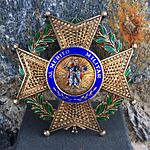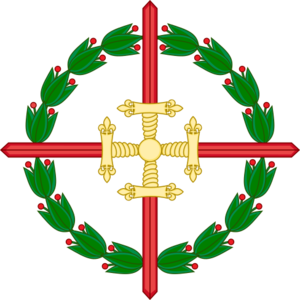Laureate Cross of Saint Ferdinand facts for kids
The Royal and Military Order of Saint Ferdinand is a special award from Spain. It is the highest military honor given for bravery. The award itself is called the Laureate Cross of Saint Ferdinand.
This award is given to people who show great courage. They must act to protect their country, its people, or help keep peace around the world. This is especially true when they face immediate danger. Members of the Spanish Armed Forces, both current and former, can receive this honor.
The King or Queen of Spain is the leader of the Order of Saint Ferdinand. They oversee special meetings held every two years. These meetings take place at the Royal Monastery of El Escorial. A person called the Grand Master helps the monarch manage the Order.
What Makes Someone a Hero?
The Royal Military Order of Saint Ferdinand has clear rules for giving out this award. These rules make sure that only truly heroic actions are recognized.
- The person's main goal was not just to save themselves.
- They did not risk their life, or the lives of others, just to get an award.
- They tried to cause as little harm as possible. They also tried to keep their own team safe.
- The action happened even when things were very difficult or dangerous.
- Their actions made a big, important difference in the situation.
History of the Order
The Royal Military Order of Saint Ferdinand was created in 1811. This happened during a time when King Ferdinand VII was not on the throne. A group called the Cortes of Cádiz set up the award. They wanted to honor very brave acts in battle.
When King Ferdinand returned to Spain in 1815, he approved the award. It has been given to many brave people throughout history. Some famous awardees include Marcelo Azcárraga Palmero, Juan Prim, and José Enrique Varela Iglesias. Varela Iglesias even received the award twice! Other notable recipients include Francisco Franco Bahamonde and Mohamed Meziane.
See also
 In Spanish: Cruz Laureada de San Fernando para niños
In Spanish: Cruz Laureada de San Fernando para niños
 | May Edward Chinn |
 | Rebecca Cole |
 | Alexa Canady |
 | Dorothy Lavinia Brown |



